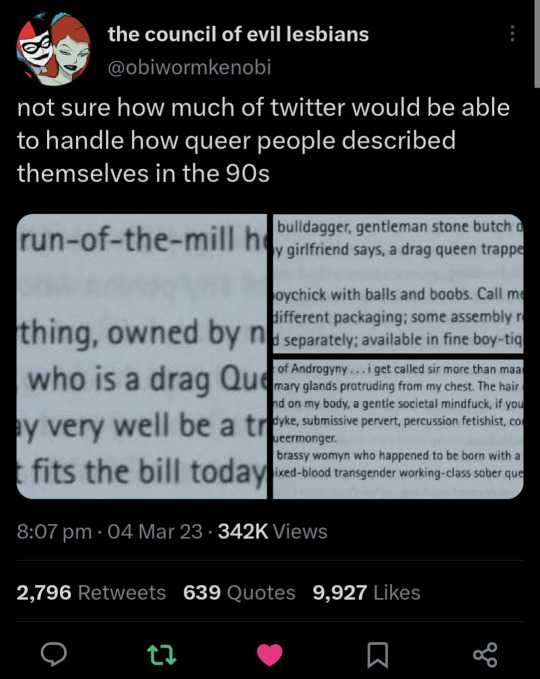A collection of posts, links, and etc. for kids who might want to know how the world has got to the climate we live in. A collaborative history to LGBT+ that typical high school educations neglect to teach. A new blog, mods welcome.
Don't wanna be here? Send us removal request.
Text
In ~these times~ it is important for queer people to be reminded of what "coming out" originally meant. "Coming out" did not mean telling all of your co-workers something super stigmatized and vulnerable about you, wearing your queer status on your sleeve in public, informing the police or government institutions about your sexuality, or even telling your parents. "Coming out" meant venturing out into the queer community; being among other queers as a queer yourself.
Coming out isn't about telling the entire world when doing so is not safe for you, it's not about arming your enemies with information they could use against you. No, coming out is about making a fulfilling queer life possible for yourself through participation in the queer community. It is about escaping the restrictions and dangers of the cisgender heterosexual world by rooting oneself more deeply into the queer one.
And you can always do that. No matter how oppressed we are. No matter how much the culture shifts and policies are enacted to terrorize us. We are always able to be ourselves when we are amongst each other. And living our queerness has always been a collective social project, not just a matter of personal exposure.
27K notes
·
View notes
Text
Why is it referred to as coming out of the closet?
269K notes
·
View notes
Text
this might be because I’m a family law lawyer and also an old crone who remembers when marriage equality wasn’t a thing (as in, marriage equality only became nation-wide two months before I went to law school), but I have Strong Feelings about the right to marry and all the legal benefits that come with it
like I’m all for living in sin until someone says they don’t want to get married because it’s ~too permanent~ and in the same breath start talking about having kids or buying a house with their significant other. then I turn into a 90-year-old passive-aggressive church grandma who keeps pointedly asking when the wedding is. “yes, a divorce is very sad and stressful, but so is BEING HOMELESS BECAUSE YOU’RE NOT ENTITLED TO EQUITABLE DISTRIBUTION OF MARITAL PROPERTY, CAROLINE!”
64K notes
·
View notes
Text
So what I’ve learned from the past couple months of being really loud about being a bi woman on Tumblr is: A lot of young/new LGBT+ people on this site do not understand that some of the stuff they’re saying comes across to other LGBT+ people as offensive, aggressive, or threatening. And when they actually find out the history and context, a lot of them go, “Oh my god, I’m so sorry, I never meant to say that.”
Like, “queer is a slur”: I get the impression that people saying this are like… oh, how I might react if I heard someone refer to all gay men as “f*gs”. Like, “Oh wow, that’s a super loaded word with a bunch of negative freight behind it, are you really sure you want to put that word on people who are still very raw and would be alarmed, upset, or offended if they heard you call them it, no matter what you intended?”
So they’re really surprised when self-described queers respond with a LOT of hostility to what feels like a well-intentioned reminder that some people might not like it.
That’s because there’s a history of “political lesbians”, like Sheila Jeffreys, who believe that no matter their sexual orientation, women should cut off all social contact with men, who are fundamentally evil, and only date the “correct” sex, which is other women. Political lesbians claim that relationships between women, especially ones that don’t contain lust, are fundamentally pure, good, and unproblematic. They therefore regard most of the LGBT community with deep suspicion, because its members are either way too into sex, into the wrong kind of sex, into sex with men, are men themselves, or somehow challenge the very definitions of sex and gender.
When “queer theory” arrived in the 1980s and 1990s as an organized attempt by many diverse LGBT+ people in academia to sit down and talk about the social oppressions they face, political lesbians like Jeffreys attacked it harshly, publishing articles like “The Queer Disappearance of Lesbians”, arguing that because queer theory said it was okay to be a man or stop being a man or want to have sex with a man, it was fundamentally evil and destructive. And this attitude has echoed through the years; many LGBT+ people have experience being harshly criticized by radical feminists because being anything but a cis “gold star lesbian” (another phrase that gives me war flashbacks) was considered patriarchal, oppressive, and basically evil.
And when those arguments happened, “queer” was a good umbrella to shelter under, even when people didn’t know the intricacies of academic queer theory; people who identified as “queer” were more likely to be accepting and understanding, and “queer” was often the only label or community bisexual and nonbinary people didn’t get chased out of. If someone didn’t disagree that people got to call themselves queer, but didn’t want to be called queer themselves, they could just say “I don’t like being called queer” and that was that. Being “queer” was to being LGBT as being a “feminist” was to being a woman; it was opt-in.
But this history isn’t evident when these interactions happen. We don’t sit down and say, “Okay, so forty years ago there was this woman named Sheila, and…” Instead we queers go POP! like pufferfish, instantly on the defensive, a red haze descending over our vision, and bellow, “DO NOT TELL ME WHAT WORDS I CANNOT USE,” because we cannot find a way to say, “This word is so vital and precious to me, I wouldn’t be alive in the same way if I lost it.” And then the people who just pointed out that this word has a history, JEEZ, way to overreact, go away very confused and off-put, because they were just trying to say.
But I’ve found that once this is explained, a lot of people go, “Oh wow, okay, I did NOT mean to insinuate that, I didn’t realize that I was also saying something with a lot of painful freight to it.”
And that? That gives me hope for the future.
149K notes
·
View notes
Text
This is what the fight is like
Sooo, apparently the extremely tenuous and recent nature of the LGBTQ+ community's legal right to exist was not actually super widely known to a lot of people on Tumblr?
Which clarifies some stuff in retrospect. I have so often wanted to grab people by their lapels and shout, "Stop picking on someone for not meeting your entry requirements! We need everyone we can get, you asshole! DON'T YOU KNOW HOW MUCH THEY HATE US OUT THERE?"
Aaaapparently... no, they did not know. Or they knew and were a conservative psyop preparing the ground for our loss of legal rights. Fun times!
So: Look, it is bad. Shit is scary. They really do hate us out there. You're not wrong.
But: This is what we've always fought. This boat we're in with its antique fittings and strange markings on the floor is a battleship. Work has always been going on in the basements, and when shit gets tough, we clear away clutter and roll out the cannons.
I found this chart a couple weeks ago and hung onto it because it felt like the map to my first 25 years on this earth:
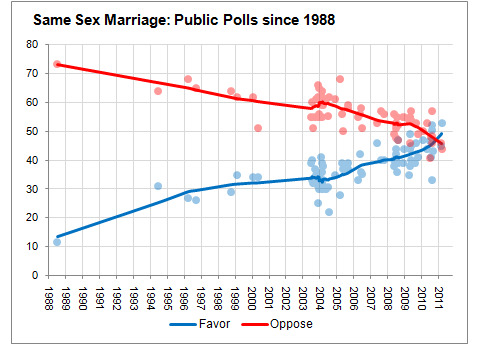
[Image description: A graph titled "Same Sex Marriage: Public Polls since 1988." It is from FiveThirtyEight's NYT column. It records the percentage of US Americans polled who would say yes or no to legalizing same-sex marriage, from 1988 to 2011.
The two lines begin with roughly 10% saying yes in 1988, and 70% saying no; the two lines gradually draw closer over the years, until by 2011, the percent saying finally dips under 50%, and the group saying yes makes a tentative reach for the majority. End of image description.]
After some great social change has happened, when everyone has admitted that gay marriage is very cute and Pride is a colourful parade, hooray, people like to pretend that it was just natural and inevitable and happened on its own. People just became less prejudiced! Courts just decided on a case! Governments just passed a law!
In reality, it was a vicious fucking fight, every fucking time. Every fucking where. There are a lot of people who deeply, sincerely believe that a hundred years ago, society had good rules about sex and gender and intercourse and marriage, and that changing those rules has made the world worse. They don't always agree on the specifics, but they can work together far enough to fight anyone with new ideas.
This is why we are a community. Even when we don't have the same experiences of attraction or identity, even when we don't do the same things, even when we have wildly different ideas of a good time. Because when these groups take aim, we're all under fire, and none of us is responsible for why they hate us.
In some ways I think it's a miracle that there seems to be a generation that did not grow up, as I grew up, constantly glued to news reports about What Percentage of Society Hates Us this month. I can't imagine who I'd be if my brain and heart and soul hadn't been tied up, that whole time, in the political question of whether I'd get to dream of a decent future.
I think that it will give us strength to have people who can imagine a world where no one hates us. Who believe in it so strongly they can taste it. That's my prediction: If you didn't know this was coming, you'll be a boon to us, because we have always needed joy so fiercely, in this fight, to keep us going on. We have needed drag queens and punk bands and "her wife" and safe space stickers. Parade floats and wedding days and little dogs with rainbow collars, badges and banners and meetups, because more than anything else we need to fight our own despair, and our fear that the world will never get any better than this.
It will. We know it will. We can taste it.
Look up to the history, organizations, and people who've got us this far for information on what forms of activism will actually advance our political goals. Look to the side to make sure the comrades within reach are keeping their heads above water, and that you're keeping enough joy going to stay alive. Look back to see who's more vulnerable than you are that you might have forgotten or been tempted to leave behind. Look after each other. Look after yourself.
We can do this.
To your battle stations.
14K notes
·
View notes
Text
“In 1984, when Ruth Coker Burks was 25 and a young mother living in Arkansas, she would often visit a hospital to care for a friend with cancer.
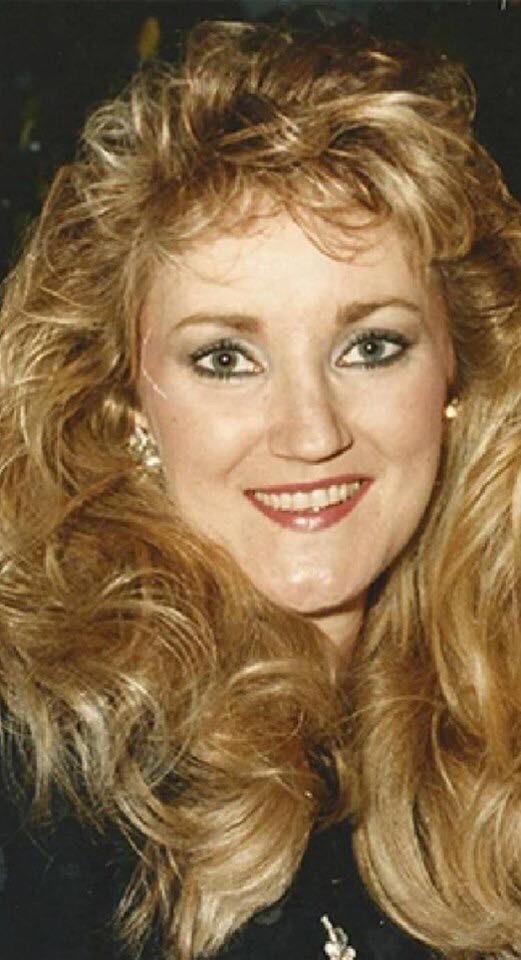
During one visit, Ruth noticed the nurses would draw straws, afraid to go into one room, its door sealed by a big red bag. She asked why and the nurses told her the patient had AIDS.
On a repeat visit, and seeing the big red bag on the door, Ruth decided to disregard the warnings and sneaked into the room.
In the bed was a skeletal young man, who told Ruth he wanted to see his mother before he died. She left the room and told the nurses, who said, “Honey, his mother’s not coming. He’s been here six weeks. Nobody’s coming!”
Ruth called his mother anyway, who refused to come visit her son, who she described as a “sinner” and already dead to her, and that she wouldn’t even claim his body when he died.
“I went back in his room and when I walked in, he said, “Oh, momma. I knew you’d come”, and then he lifted his hand. And what was I going to do? So I took his hand. I said, “I’m here, honey. I’m here”, Ruth later recounted.
Ruth pulled a chair to his bedside, talked to him
and held his hand until he died 13 hours later.
After finally finding a funeral home that would his body, and paying for the cremation out of her own savings, Ruth buried his ashes on her family’s large plot.
After this first encounter, Ruth cared for other patients. She would take them to appointments, obtain medications, apply for assistance, and even kept supplies of AIDS medications on hand, as some pharmacies would not carry them.
Ruth’s work soon became well known in the city and she received financial assistance from gay bars, “They would twirl up a drag show on Saturday night and here’d come the money. That’s how we’d buy medicine, that’s how we’d pay rent. If it hadn’t been for the drag queens, I don’t know what we would have done”, Ruth said.
Over the next 30 years, Ruth cared for over 1,000 people and buried more than 40 on her family’s plot most of whom were gay men whose families would not claim their ashes.
For this, Ruth has been nicknamed the ‘Cemetery Angel’.”— by Ra-Ey Saley
403K notes
·
View notes
Text
what's so striking to me about younger queer generations rn isn't the lack of knowledge about queer history, but the complete unwillingness to engage with it, when confronted with an identity or history they haven't heard of before they react with disgust rather than curiosity. (for example) instead of asking where the leather pride flag came from and what the leather community is and represents they immediately question the need for something like that to exist, not even willing to listen and learn from both elders and peers. this is also more broadly a problem in leftist spaces in general, being reactionary is somehow the default now, and anything that's different or unknown must be an attack and bad. really hoping y'all manage to grow out of this deeply conservative way of interacting with the world.
45K notes
·
View notes
Text
I'm kind of at a point where the "queer spaces" i feel safest in are the ones that have a pet cishet dude or two hanging around
83K notes
·
View notes
Note
Are you a Gold Star lesbian? (Just in case you don't know what it means, a Gold Star lesbian is a lesbian that has never had the sex with a guy and would never have any intentions of ever doing so)
So I got this ask a while ago, and I've been lowkey thinking about it ever since.
First: No. I am a queer, cranky dyke who is too old for this sort of bullshit gatekeeping.
Second: What an unbelievable question to ask someone you don't even know! What an incomprehensibly rude thing to ask, as if you're somehow owed information about my sexual history. You're not! No one—and I can't reiterate this enough, but no one—owes you the details of their sex lives, of their trauma, or of anything about themselves that they don't feel like sharing with you.
The clickbait mills of the internet and the purity police of social media would like nothing more than to convince everyone that you owe these things to everyone. They would like you to believe that you have to prove that you're traumatized enough to identify with this character, that you can't sell this article about campus rape without relating it to your own sexual assault, that you can't talk about queer issues without offering up a comprehensive history of your own experiences, and none of those things are true. You owe people, and especially random strangers on the internet, nothing, least of all citations to somehow prove to them that you have the right to talk about your own life.
This makes some people uncomfortable, and to be clear, I think that that's good: people who feel entitled to demand this information should be uncomfortable. Refusing to justify yourself takes power away from people who would very much like to have it, people who would like to gatekeep and dictate who is permitted to speak about what topics or like what things. You don't have to justify yourself. You don't have to explain that you like this ship because this one character reminds you a bit of yourself because you were traumatized in a vaguely similar way and now— You don't have to justify your queerness by telling people about the best friend you had when you were twelve, and how you kissed, and she laughed and said it was good practice for when she would kiss boys and your stomach twisted and your mouth tasted like bile and she was the first and last girl you kissed, but—
You don't owe anyone these pieces of yourself. They're yours, and you can share them or not, but if someone demands that you share, they're probably not someone you should trust.
Third: The idea of gold star lesbians is a profoundly bi- and trans- phobic idea, often reducing gender to genitals and the long, shared history of queer women of all identities to a stark, artificial divide where some identities are seen as purer or more valuable than others. This is bullshit on all counts.
There's a weird and largely artificial division between bisexuals and lesbians that seems to be intensifying on tumblr, and I have to say: I hate it. Bisexual women aren't failed lesbians. They're not somehow less good or less valid because they're attracted to [checks notes] people. Do you think that having sex with a man somehow changes them? What are you so worried about it for? I've checked, and having sex with a man does not, in fact, make your vagina grow teeth or tentacles. Does that make you feel better? Why is what other people are doing so threatening to you?
Discussions of gold star lesbians are often filled with tittering about hehe penises, which is unfortunate, since I know a fair few lesbians who have penises, and even more lesbians who've had sex with people, men and women alike, who have penises. I'm sorry to report that "I'm disgusted by a standard-issue human body part" is neither a personality nor anything to be proud of. I'm a dyke and I don't especially like men, but dicks are just dicks. You don't have to be interested in them, but a lot of people have them, and it doesn't make you less of a lesbian to have sex with someone who has a dick.
There's so much garbage happening in the world—maybe you haven't noticed, but things are kind of Not Great in a lot of places, and there's a whole pandemic thing that's been sort of a major buzzkill? How is this something that you're worried about? Make a tea, remind yourself that other people's genitalia and sexual history are none of your business, maybe go watch a video about a cute animal or something.
Fourth: The idea of gold star lesbians is a shitty premise that argues that sexuality is better if it's always been clear-cut and straightforward—but it rarely is. We live in a very, very heterosexist culture. I didn’t have a word for lesbian until many years after I knew that I was one. How can you say that you are something when your mouth can’t even make the shape of it? The person you are at 24 is different to the person you are at 14, and 34, and 74. You change. You get braver. The world gets wider. You learn to see possibilities in the shadows you used to overlook. Of course people learn more about themselves as they age.
Also, many of us, especially those of us who grew up in smaller towns, or who are over the age of, say, 25, grew up in times and places where our sexuality was literally criminal.
Shortly after I graduated high school, a gay man in my state was sentenced to six months in jail. Why? Well, he’d hit on someone, and it was a misdemeanor to "solicit homosexual or lesbian activity", which included expressing romantic or sexual interest in someone who didn’t reciprocate. You might think, then, that I am in fact quite old, but you would be mistaken. The conviction was in 1999; it was overturned in 2002.
I grew up knowing this: the wrong thing said to the wrong person would be sufficient reason to charge me with a crime.
In the United States, the Defense of Marriage Act was passed in 1996, clarifying that according to the federal government, marriage could only ever be between one man and one woman. It also promised that even if a state were to legalize same-sex unions, other states wouldn't have to recognize them if they didn't want to. And wow, they super did not want to, because between 1998 and 2012, a whopping thirty states had approved some sort of amendment banning same-sex marriage.
Every queer person who's older than about 25 watched this, knowing that this was aimed at people like them. Knowing that these votes were cast by their friends and their families and their teachers and their employers.
Some states were worse than others. Ohio passed their bill in 2004 with 62% approval. Mississippi passed theirs the same year with 86% approval. Imagine sitting in a classroom, or at work, or in a church, or at a family dinner, and knowing that statistically, at least two out of every three people in that room felt you shouldn't be allowed to marry someone you loved.
Matthew Shepard was tortured to death in October of 1998. For being gay, for (maybe) hitting on one of the men who had planned to merely rob him. Instead, he was tortured and left to die, tied to a barbed wire fence. His murderers were both sentenced to two consecutive life terms in prison. This was controversial, because a nonzero number of people felt that Shepard had brought it upon himself.
Many of us sat at dinner tables and listened to this discussion, one that told us, over and over, that we were fundamentally wrong, fundamentally undeserving of love or sympathy or of life itself.
This is a tiny, tiny sliver of history—a staggeringly incomplete overview of what happened in the US over about ten years. Even if this tiny sliver is all that there were, looking at this, how could you blame someone for wanting to try being not Like This? How can you fault someone who had sex, maybe even had a bunch of sex, hoping desperately that maybe they could be normal enough to be loved if they just tried harder? How can you say that someone who found themself an uninteresting but inoffensive boyfriend and went on dates and had sex and said that it was fine is somehow less valuable or less queer or less of a lesbian for doing so? For many people, even now, passing as straight, as problematic as that term is, is a survival skill. How dare you imply that the things that someone did to protect themself make them worth less? They survived, and that's worth literally everything.
Fifth, finally: What is a gold star, anyhow? You've capitalized it, like it's Weighty and Important, but it's not. Gold stars were what your most generous grade school teacher put on spelling tests that you did really well on. But ultimately, gold stars are just shiny scraps of paper. They don't have any inherent value: I can buy a thousand of them for five bucks and have them at my door tomorrow. They have only the meaning that we give them, only the importance that we give them. We’re not children desperately scrabbling for a teacher’s approval anymore, though. We understand that good and bad are more of a spectrum than a binary, and that a gold star is a simplification. We understand that no number of gold stars will make us feel like we’re special enough or good enough or important enough, or fix the broken places we can still feel inside ourselves. Only we can do that.
The stars are only shiny scraps of paper. They offer us nothing; we don’t need them. I hope that someday, you see that, too.
20K notes
·
View notes
Text
If your goal is to normalize gender-nonconformity you’re gonna have to accept that some people will fuck with gender as hard as they can while still being unequivocally, 100% cis and that is okay. There’s no egg to crack or callout to write. This is a good thing actually.
144K notes
·
View notes
Photo
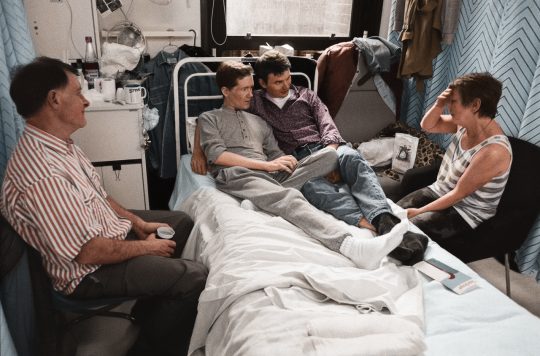
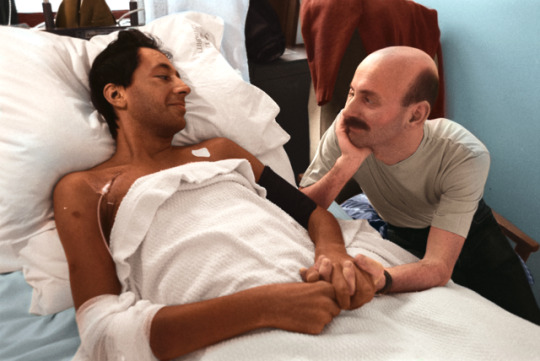
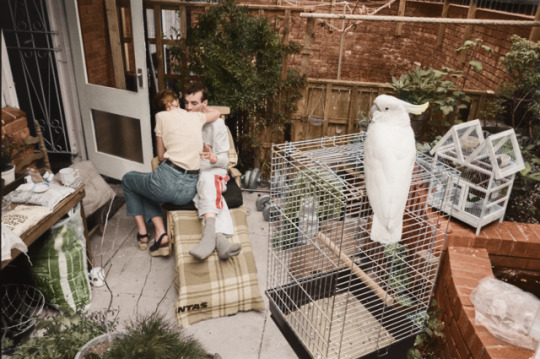


the humanity of the AIDS crisis: the ward by gideon mendel
colorized by me
255K notes
·
View notes
Text
"adult who logs on and works themself into a furor over teenagers not having perfectly articulated opinions and thoughts on the world" is quickly becoming my least favorite genre of Poster Du Jour
32K notes
·
View notes
Text
Come here, baby gays, and let me tell you the story about how James Somerton made me so fucking angry with a single line that I had to make this post.
As I now know, most of his audience is young queers and there are things we NEED you to know.
The fight for marriage equality was a massive fucking deal and I will tell you why with a very personal story.
My mom was a nurse during the AIDS crisis. And I mean she started working as a nurse out of school in 85. My mom was on the front lines. She worked with so many AIDS patients that it genuinely altered her brain chemistry. My mother was a homophobe before her nursing career. She was a massive supporter of gay rights until she died in July because of what she saw during her career.
And what did she see?
She saw people who had been abandoned by their families dying with their partners at their side.
And then suddenly…the family would materialize, ban the partner from the room, kick them out of their homes they had lived in with their dying partners for decades, and then watched them ban their partners from even attending the funerals or visiting the graves. Imagine being denied your right to grieve.
And why was this possible? Oh simple. They weren’t married. They weren’t legally bound, the partners weren’t considered next of kin because they weren’t fucking married.
I watched my mom pass. It was horrible and painful and traumatic and terrifying. But it was closure. And I wouldn’t have it any other way because I know…that who my mom wanted by her when she passed was my dad. Because she was scared, she wanted her partner by her side and she was terrified she was going to die. My dad couldn’t be there. He had to work, which sounds cold but understand he had been off work for a month by that point and he was the only one who had health insurance. He wanted to be there, we had made plans to take her off the life support when he came back (we were 4 hours from him) but there was a freak accident and she passed the night after he left to return to work.
Why am I telling you this? Because I need you to understand how important this is to some people. So you can understand how big a slap to the face it is to have people say “marriage equality isn’t that important”. You can understand why someone like James Somerton rolling his eyes at marriage equality and implying we weren’t focused on job equality and discrimination (information that is WHOLEY untrue) would make me see red.
It’s not trivial. It’s not meaningless. It wasn’t about “assimilating” or “appearing normal” (we’re already normal).
It’s about people who had their children taken from them because they weren’t the biological parent. It’s about people who never got to comfort their loved ones in their final days. It’s about people who weren’t able to comforted by their partners in their final days.
So the next time you think “why waste your time on something as trivial as marriage?” Remember my mother. Look up testimony from victims of the AIDS crisis. Remember the people who advocated for marriage equality were the survivors who were torn from the love of their life.
Remember that we advocated so damn hard to give you the right to grieve.
48K notes
·
View notes
Text
There are parts of queer history we will never touch. People who lived quiet lives and were forgotten within a generation. Stories that were tucked under the bed and hidden from the world. Diaries that were burned with nothing to recover. Beyond the hiding, there is queerness that never had the chance to be discovered, people who felt different but never gave themselves a moment or sliver of grace to explore, much less vocalize it. This is worth mourning. It is worth cradling to your chest and feeling to the fullest devastation. More than anything else, it is worth remembering.
11K notes
·
View notes
Text
there’s this tweet that was like “y’all fought for marriage equality just to be in open relationships” and i know it’s kinda a joke or whatever but it makes me so sick. young queers are so busy respectability politicking and hating open relationships and polyamory that they’re willing to minimize the real reasons for the marriage equality fight. Like hello??? Think about all the husbands during the aids crisis who couldn’t see their man because the family took over as next of kin or bury him because he had no legal rights as his partner? Think about all the partners who can’t share health benefits, or adopt or file taxes together. Who cares if they fuck other people on the weekend. Legal protections matter despite whatever your feelings on marriage as an institution or the sanctity of monogamy. it still matters. I hateee seeing young people joke about and take for granted things our elders needed.
22K notes
·
View notes
Text
I wish Tumblr would learn that you don't have to trash older, less explicitly gay works when something newer with more textual, explicit rep comes along.
how many creators watched explicitly gay stories be toned down in adaptation. how many got away with as much as they could get away with at the time and pushed the door open a little wider so a new thing could be even more open.
have a little respect and celebrate what we've achieved instead of dump on older works for not being as perfect as you'd like them to be
19K notes
·
View notes
